- Home
- Technical Cooperation Projects
- Index of Countries
- Africa
- Malawi
- Project for Market-Oriented Smallholder Horticulture Empowerment and Promotion (MA-SHEP)
- Project News
- MA-SHEP conducted Monitoring Visit in 7 DAOs
Project News
2018-09-07
MA-SHEP conducted Monitoring Visit in 7 DAOs
MA-SHEP conducted the "Monitoring of the Implemented Activities of the MA-SHEP Package (Ver.1) in the District Agriculture Offices (DAOs) of Kasungu & Salima ADDs" from 4th to 7th September in Dowa West, Dowa East, Mchinji, Kasungu, Ntchisi, Salima and Nkhotakota DAOs.
The purpose of the visit is to review implemented activities of the MA-SHEP Package (Ver.1) at the district level as well as to assess the progress of the In-field Training for the target Farmer Groups.
Through this monitoring visit, we found some good changes at the field level as follows:
(Dowa East) Members of Mndila Irrigation Scheme mentioned that "Through the market survey, we were aware that even if we produce a large amount of Onions at once, we can't sell them at once. Therefore, we divided our field and planted Onions at different timing, so that we can supply smaller amount of Onion constantly to the market.".
(Mchinji) Member of Madzi Irrigation Scheme said that "After we conducted the market survey, we found which crops have high demand in the market. It motivated us very much. At that time, there was a NGO offered us to provide irrigation pipes, but because they couldn't deliver the pipes to the group site due to transport problems, we shared the transportation costs and brought them ourselves. If we did not know that the crops would definitely be sold on the market, we wouldn't share the transport costs.".
(Nkhotakota) Chitsanzo Irrigation Club conducted market survey at 5 markets and secondary schools. In addition, Nkhunga EPA conducted Stakeholder Meeting to invite 5 farmer clubs and 9 stakeholders using own resources. As a result, the ago-dealers were able to know the agricultural chemicals that the farmers needed, and promised to keep the inventory of the product for the farmers. Furthermore, Chitsanzo Irrigation Club found that secondary schools invite bids every term. So that farmers decided to apply those secondary schools, and they were selected as a contract supplier out of 11 applicants. The current selling price is 7 times higher than they used to sell to venders.
We found not only good findings but also some challenges at the field level. Based on the results of this monitoring visit, MA-SHEP Project Team will improve the contents of the MA-SHEP Package for the 2nd Batch implementation.
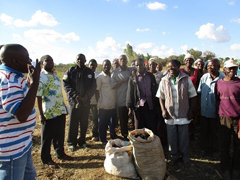 1. Farmers showing "Biochar" made during in-field training (Dowa West)
1. Farmers showing "Biochar" made during in-field training (Dowa West)
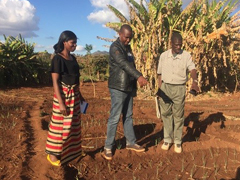 2-1. Districts and EPA staff showing the different stage of Onions planted in the divided plots of Mndila Irrigation Scheme Group (Dowa East)
2-1. Districts and EPA staff showing the different stage of Onions planted in the divided plots of Mndila Irrigation Scheme Group (Dowa East)
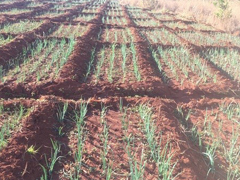 2-2. Mndila Irrigation Scheme Group coordinating the planting time among members in order to constantly supply Onions to the market (Dowa East)
2-2. Mndila Irrigation Scheme Group coordinating the planting time among members in order to constantly supply Onions to the market (Dowa East)
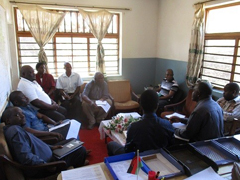 3. Interview with MA-SHEP District Management Team (Mchinji)
3. Interview with MA-SHEP District Management Team (Mchinji)
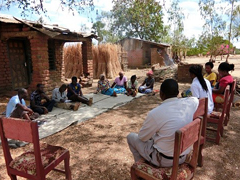 4. Interview with Sululu Farmer Group (Salima)
4. Interview with Sululu Farmer Group (Salima)
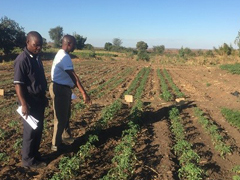 5. Technical staff (left) of Farmers Organization Ltd. (agro-dealer) supporting Tomato cultivation of Kanyenda Group (Kasungu)
5. Technical staff (left) of Farmers Organization Ltd. (agro-dealer) supporting Tomato cultivation of Kanyenda Group (Kasungu)
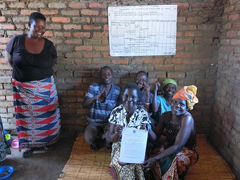 6. Farmers showing the "Crop Planting & Marketing Calendar" and the contract letters signed between the group and two secondary schools (Nkhotakota)
6. Farmers showing the "Crop Planting & Marketing Calendar" and the contract letters signed between the group and two secondary schools (Nkhotakota)
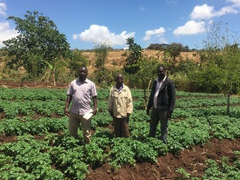 7. Extension staff and a farmer member of Upper Mpherere Group showing Potato field (Ntchisi)
7. Extension staff and a farmer member of Upper Mpherere Group showing Potato field (Ntchisi)
- About JICA
- News & Features
- Countries & Regions
- Our Work
- Thematic Issues
- Types of Assistance
- Partnerships with Other Development Partners
- Climate Change / Environmental and Social Considerations
- Evaluations
- Compliance and Anti-corruption
- Science and Technology Cooperation on Global Issues
- Research
- JICA Development Studies Program / JICA Chair
- Support for the Acceptance of Foreign HRs / Multicultural and Inclusive Community
- Publications
- Investor Relations
